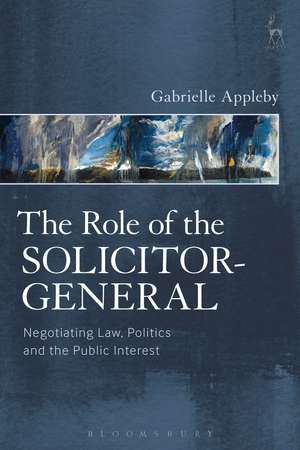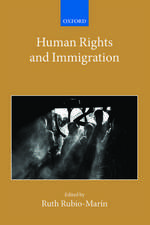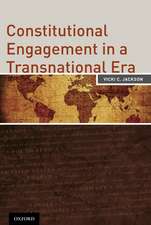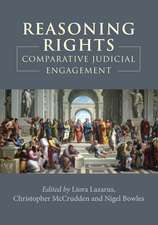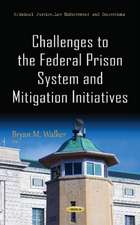The Role of the Solicitor-General: Negotiating Law, Politics and the Public Interest
Autor Dr Gabrielle Applebyen Limba Engleză Hardback – 15 iun 2016
| Toate formatele și edițiile | Preț | Express |
|---|---|---|
| Paperback (1) | 303.46 lei 6-8 săpt. | |
| Bloomsbury Publishing – 17 oct 2018 | 303.46 lei 6-8 săpt. | |
| Hardback (1) | 572.47 lei 6-8 săpt. | |
| Bloomsbury Publishing – 15 iun 2016 | 572.47 lei 6-8 săpt. |
Preț: 572.47 lei
Preț vechi: 818.12 lei
-30% Nou
Puncte Express: 859
Preț estimativ în valută:
109.54€ • 114.38$ • 90.46£
109.54€ • 114.38$ • 90.46£
Carte tipărită la comandă
Livrare economică 15-29 aprilie
Preluare comenzi: 021 569.72.76
Specificații
ISBN-13: 9781849467124
ISBN-10: 1849467129
Pagini: 368
Dimensiuni: 156 x 234 x 30 mm
Greutate: 0.7 kg
Editura: Bloomsbury Publishing
Colecția Hart Publishing
Locul publicării:London, United Kingdom
ISBN-10: 1849467129
Pagini: 368
Dimensiuni: 156 x 234 x 30 mm
Greutate: 0.7 kg
Editura: Bloomsbury Publishing
Colecția Hart Publishing
Locul publicării:London, United Kingdom
Caracteristici
Draws on extensive interviews with past Solicitor Generals, as welll as the first holistic historical explanation of the Australian office, and in-depth analysis of the current legislative, common law and constitutional framework of the office.
Notă biografică
Gabrielle Appleby is Associate Professor of Law at UNSW.
Cuprins
Part I: Introducing the Solicitor-General1. The Solicitor-General and the Constitution 2. The Law Officers: An Historical and Comparative Introduction 3. The Evolution of an Australian Solicitor-General 4. Counsel for the Crown Part III: Negotiating the Tensions5. The Solicitor-General as Adviser 6. The Solicitor-General as Advocate 7. Independence 8. Conclusions
Recenzii
This book is a pioneer in undertaking a full- scale examination of the office of solicitor-general and in analysing and explaining the functions and responsibilities which attach to that office.
Appleby's book has the virtue of asserting a more principled and high-minded approach to the office that is likely to form the basis of the future understanding of the office.
There is no doubt that the author has managed to describe and create an interest in the office of the Solicitor-General, which up until now has been little known and of a lesser interest to the legal community, let alone the general public. It is hoped that the publication of this book will stimulate both law academics and students to gain a greater knowledge of an office, which as the text has illustrated, can have a significant bearing on Australian Constitutional issues.
(...) this is a book of outstanding utility and quality. Appleby has combined research and analysis in a practical, illuminating and interesting manner. Her integration of the history and experience of the office of the Solicitor-General into the constitutional setting is illuminating, and gives rise to numerous practical and theoretical issues, with which she grapples. There is plenty of material to stimulate discussion about the office andfunctions of the Solicitor-General.
This book is at once topical and important, drawing on a legal, historical, comparative and empirical analysis to illuminate the depth, breadth, nuance and richness of the Solicitor General's role
Dr Appleby has carefully drawn many threads together to reach conclusions about the unique aspects of this peculiar legal office. It is not only a learned work; it is also a vivid and readable work. It is also an entirely original work based on her personal and fresh research. That it was the product not of an experienced academic but of a student writing her PhD thesis is remarkable.
The enduring value of Appleby's book is that it gives a comprehensive, and principled, analysis of the office in both theory and practice. The rarity of this book is that it was published moments before it was most urgently needed.
Appleby's book has the virtue of asserting a more principled and high-minded approach to the office that is likely to form the basis of the future understanding of the office.
There is no doubt that the author has managed to describe and create an interest in the office of the Solicitor-General, which up until now has been little known and of a lesser interest to the legal community, let alone the general public. It is hoped that the publication of this book will stimulate both law academics and students to gain a greater knowledge of an office, which as the text has illustrated, can have a significant bearing on Australian Constitutional issues.
(...) this is a book of outstanding utility and quality. Appleby has combined research and analysis in a practical, illuminating and interesting manner. Her integration of the history and experience of the office of the Solicitor-General into the constitutional setting is illuminating, and gives rise to numerous practical and theoretical issues, with which she grapples. There is plenty of material to stimulate discussion about the office andfunctions of the Solicitor-General.
This book is at once topical and important, drawing on a legal, historical, comparative and empirical analysis to illuminate the depth, breadth, nuance and richness of the Solicitor General's role
Dr Appleby has carefully drawn many threads together to reach conclusions about the unique aspects of this peculiar legal office. It is not only a learned work; it is also a vivid and readable work. It is also an entirely original work based on her personal and fresh research. That it was the product not of an experienced academic but of a student writing her PhD thesis is remarkable.
The enduring value of Appleby's book is that it gives a comprehensive, and principled, analysis of the office in both theory and practice. The rarity of this book is that it was published moments before it was most urgently needed.
